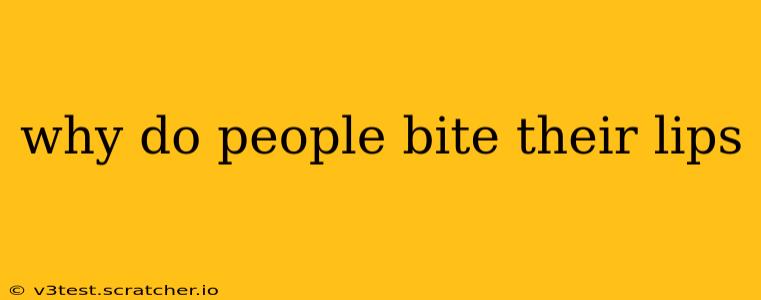Why Do People Bite Their Lips? Unpacking the Habit and Its Meanings
Lip biting is a common habit, often unconscious, with a surprisingly wide range of potential causes. While sometimes harmless, understanding the underlying reasons can be crucial for addressing the behavior and any associated anxieties or concerns. This comprehensive guide explores the various factors behind lip biting, offering insights into its psychological and physical aspects.
Is Lip Biting a Sign of Anxiety?
Yes, lip biting is frequently linked to anxiety. When stressed or anxious, many people unconsciously engage in self-soothing behaviors, and lip biting is a prime example. The repetitive action can provide a sense of control or comfort in a situation feeling overwhelming. The act of biting can distract from the anxious thoughts, offering a temporary release of tension. This is especially true for those who may experience generalized anxiety disorder (GAD) or other anxiety-related conditions.
What Does It Mean When Someone Bites Their Lips?
The meaning behind lip biting can vary greatly depending on the context and individual. While anxiety is a significant factor, other contributing elements include:
- Nervousness or discomfort: In social situations, during presentations, or when facing uncertainty, lip biting can be a visible manifestation of nervousness.
- Habit: For some, lip biting is simply a ingrained habit, performed subconsciously without necessarily reflecting an underlying emotional state. It might have started as a coping mechanism for childhood anxieties but persists even in the absence of significant stress.
- Dry lips: Sometimes, the simple dryness of the lips can lead to biting as a means of peeling away dry skin. This is often a more physical, rather than psychological, trigger.
- Underlying medical conditions: In rare cases, lip biting can be associated with neurological disorders or other medical conditions affecting motor control.
- Compulsive behavior: In severe cases, lip biting can be a symptom of obsessive-compulsive disorder (OCD) or a related condition, where the act is performed repeatedly despite attempts to stop.
Is Lip Biting a Bad Habit?
While often harmless, chronic lip biting can lead to several negative consequences:
- Soreness and pain: Repeated biting can irritate and injure the lips, leading to pain, swelling, and even bleeding.
- Infection: Broken skin from biting provides an entry point for infection.
- Scarring: Persistent lip biting can result in scarring and discoloration of the lip tissue.
- Cosmetic concerns: Individuals may be self-conscious about the appearance of their lips due to scarring or inflammation caused by biting.
How Can I Stop Biting My Lips?
Breaking the habit of lip biting requires a multi-pronged approach:
- Identify triggers: Pay attention to situations or emotions that seem to trigger your lip biting. Keeping a journal can be helpful in identifying patterns.
- Mindfulness techniques: Practicing mindfulness helps to increase self-awareness, allowing you to recognize when you're biting your lips and consciously stop.
- Stress management techniques: Addressing underlying anxiety or stress through techniques like exercise, yoga, meditation, or therapy can significantly reduce the urge to bite.
- Keep lips moisturized: Using lip balm regularly can help prevent dryness, a common trigger for lip biting.
- Replace the behavior: Find a substitute behavior to replace lip biting, such as chewing gum, holding a stress ball, or fidgeting with a pen.
- Professional help: If lip biting is severe, persistent, or significantly impacting your quality of life, seeking professional help from a therapist or counselor can be beneficial. They can help identify underlying causes and develop effective strategies for coping.
Can Lip Biting Be a Sign of a Mental Health Condition?
Yes, while lip biting itself isn't a diagnostic criterion for any mental health condition, it can be a symptom associated with several, most notably anxiety disorders, OCD, and other conditions involving repetitive behaviors or self-harm. If lip biting is accompanied by other concerning symptoms such as significant distress, impaired daily functioning, or persistent self-harm, professional evaluation is crucial.
This exploration of lip biting highlights the complexity of the habit, emphasizing the need for self-awareness and appropriate management strategies. Understanding the underlying causes and employing suitable coping mechanisms are key to breaking the cycle and improving overall well-being. Remember, seeking professional help is always an option and can be beneficial in addressing this issue effectively.
